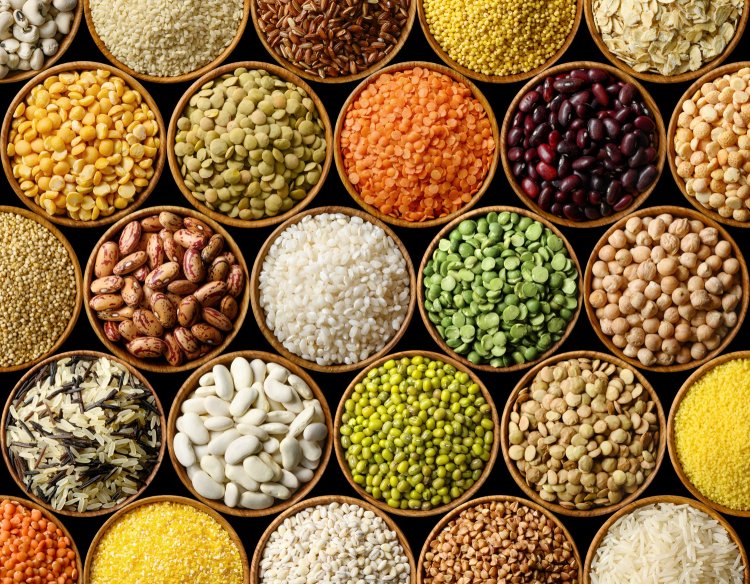Fueling Health with Legumes: Nutrient-Rich Treasures
Legumes, members of the Fabaceae family, encompass a diverse group of plants known for their nutrient-rich seeds. Throughout history, legumes have played a crucial role in diets worldwide, providing essential nutrients and sustaining communities across cultures.

Nutritional Benefits of Legumes:
Protein and Amino Acids:
Legumes are renowned for their high protein content, making them a valuable source of plant-based protein. They contain all essential amino acids, particularly important for vegetarians and vegans. The protein content in legumes compares favorably with that of meat and dairy, offering a sustainable alternative for protein intake.
Fiber-Rich Superfoods:
Both soluble and insoluble fiber are abundant in legumes. Soluble fiber aids in lowering cholesterol levels and maintaining stable blood sugar levels, while insoluble fiber supports digestive health by promoting regular bowel movements and preventing constipation.
Complex Carbohydrates and Glycemic Control:
Legumes are rich in complex carbohydrates, which have a low glycemic index. This characteristic means they release glucose into the bloodstream slowly, providing sustained energy and helping to manage blood sugar levels. This makes legumes particularly beneficial for individuals with diabetes and those aiming for weight management.
Vitamins, Minerals, and Antioxidants:
Legumes are a powerhouse of essential vitamins and minerals. They are particularly rich in B vitamins such as folate, essential for DNA synthesis and cell division. Minerals like iron and potassium are abundant, contributing to overall health and wellness. Additionally, legumes contain antioxidants such as flavonoids and polyphenols, which help combat oxidative stress and inflammation.
Culinary Versatility of Legumes:
Cooking Techniques and Recipes:
Legumes lend themselves to a variety of cooking methods. They can be soaked, boiled, pressure-cooked, or sprouted, each method altering texture and flavor. Popular dishes include hummus (made from chickpeas), dal (lentil stew), and black bean chili. These dishes showcase the versatility of legumes in global cuisine, offering flavors that range from savory to spicy.
Regional and Cultural Significance:
Different regions have unique ways of incorporating legumes into their culinary traditions. In Mediterranean cuisine, legumes like chickpeas are used in salads and stews. In South Asian cuisine, lentils form the base of many traditional dishes. Latin American cuisine features black beans in various dishes, including burritos and soups. Understanding these regional uses highlights the cultural significance and adaptability of legumes in diverse diets.
Incorporation into Modern Diets:
Legumes play a crucial role in modern dietary patterns, especially for those following vegetarian, vegan, or plant-based diets. They provide essential nutrients typically obtained from animal sources, promoting health without the environmental impact associated with meat production. Strategies for incorporating legumes include using them as a protein substitute in main dishes, adding them to salads for texture, or blending them into dips and spreads for added nutrition.
Environmental and Economic Impact:
Sustainable Farming Practices:
Legumes contribute to sustainable agriculture through nitrogen fixation, which enhances soil fertility and reduces the need for synthetic fertilizers. Their ability to improve soil health makes them beneficial in crop rotation systems, promoting sustainable farming practices worldwide.
Global Accessibility and Food Security:
Legumes are economically advantageous for small-scale farmers and accessible to diverse populations due to their affordability and long shelf life. Their role in addressing global food security issues is significant, offering a nutrient-dense food source that can be grown in various climates and regions.
In conclusion, legumes stand out as nutritional powerhouses, offering a wide array of health benefits, culinary versatility, and environmental sustainability. Incorporating more legumes into daily diets can improve overall health outcomes while supporting sustainable food production practices globally. As research continues to explore the potential benefits of legumes, their role in promoting human health and environmental stewardship remains vital for future generations.
Disclaimer:
The information provided in this article is for educational purposes only and should not be considered medical advice. If you have any health concerns or are experiencing symptoms, it is important to consult with a healthcare professional, such as a doctor or clinic, for proper diagnosis and treatment. Always seek the advice of your doctor or other qualified health provider with any questions you may have regarding a medical condition. Do not disregard professional medical advice or delay in seeking it because of something you have read in this article.
#Nutrition #Health #Legumes #PlantBased #SustainableEating #Fiber #Protein #Vegan #Vegetarian #FoodSecurity #HealthyEating #CulinaryVersatility #EnvironmentalImpact
What's Your Reaction?





















